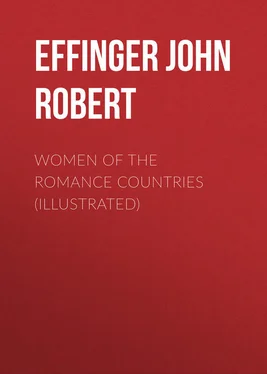John Effinger - Women of the Romance Countries (Illustrated)
Здесь есть возможность читать онлайн «John Effinger - Women of the Romance Countries (Illustrated)» — ознакомительный отрывок электронной книги совершенно бесплатно, а после прочтения отрывка купить полную версию. В некоторых случаях можно слушать аудио, скачать через торрент в формате fb2 и присутствует краткое содержание. Жанр: История, foreign_antique, foreign_prose, на английском языке. Описание произведения, (предисловие) а так же отзывы посетителей доступны на портале библиотеки ЛибКат.
- Название:Women of the Romance Countries (Illustrated)
- Автор:
- Жанр:
- Год:неизвестен
- ISBN:нет данных
- Рейтинг книги:4 / 5. Голосов: 1
-
Избранное:Добавить в избранное
- Отзывы:
-
Ваша оценка:
- 80
- 1
- 2
- 3
- 4
- 5
Women of the Romance Countries (Illustrated): краткое содержание, описание и аннотация
Предлагаем к чтению аннотацию, описание, краткое содержание или предисловие (зависит от того, что написал сам автор книги «Women of the Romance Countries (Illustrated)»). Если вы не нашли необходимую информацию о книге — напишите в комментариях, мы постараемся отыскать её.
Women of the Romance Countries (Illustrated) — читать онлайн ознакомительный отрывок
Ниже представлен текст книги, разбитый по страницам. Система сохранения места последней прочитанной страницы, позволяет с удобством читать онлайн бесплатно книгу «Women of the Romance Countries (Illustrated)», без необходимости каждый раз заново искать на чём Вы остановились. Поставьте закладку, и сможете в любой момент перейти на страницу, на которой закончили чтение.
Интервал:
Закладка:
"My good husband, with whom I have ever associated without strife;" and she declares regarding her own sorrow: "I have suffered so much anguish for the death of my beloved husband that, stunned by grief, I had well-nigh died of the same wounds!"
As soon as her strength would permit, Joanna summoned a council of her advisers and signed a commission giving Hugh de Balzo full authority to seek out the murderers and punish them. Suspicion at once fell upon Philippa the Catanese, and upon other members of her family, as her hatred of the Hungarians was well known, and her past reputation for intrigue and mystery only added strength to the accusation. Philippa, who, since the death of King Robert, had been created Countess of Montoni, was now more powerful than ever at the court, and seemed to invite the danger which was hanging over her, in the belief that no harm could touch her head. But her calculations went astray, as Balzo appeared one morning at the palace gate, produced evidence incriminating her and her intimates, and dragged them off to prison, where they were put to death in the most approved Neapolitan fashion-with lingering torments and tortures. From that day the character of the young queen underwent a most decided change. Hitherto she had been gay, frank, and confiding, now she became serious and reserved. She had always been gracious and compassionate, and rather the equal than the queen of those about her, – according to Boccaccio's description, – but treachery had come so near to her, and her trusted Philippa had proved so vile a character, that she never after gave her entire confidence to any person, man or woman.
Some two years after the death of Andreas, for reasons of state, she married her second cousin, Louis of Taranto, a brave and handsome prince of whom she had long been fond. But she was not to be allowed to enjoy her newly found happiness in peace, as her domains were soon invaded by Louis, the elder brother of Andreas, who had recently ascended his father's throne as King of Hungary, and who now came to avenge his brother's death and seize Naples by way of indemnity. Joanna, deserted by many of her nobles in these dire straits, and not knowing what to do, – as her husband seems to have played no part in this emergency, – decided upon flight as the only means of safety, and, embarking with her entire household in three galleys, she set sail for Provence, where loyal hearts awaited her coming. There she went at once to Avignon, where Pope Clement VI. was holding his court with the utmost splendor; and in the presence of the pope and all the cardinals, she made answer in her own behalf to the charges which had been made against her by the Hungarian king. Her address, which she had previously composed in Latin, has been called the "most powerful specimen of female oratory" ever recorded in history; and the Hungarian ambassadors, who had been sent to plead against her, were so confounded by her eloquence that they attempted no reply to her defence.
In the meantime, Naples, in the hands of the invaders, had been stained with blood, and then ravaged by the great plague of which Boccaccio has given us a picture. Revolting at length under the harsh measures of the Hungarian governor who had been left in charge by Louis, the Neapolitans expelled him and his followers from the city, and sent an urgent invitation to Joanna to return to her former home. Right gladly was the summons answered, and with a goodly retinue of brave knights who had sworn to die in her service she returned to her people, who welcomed her homecoming with unbounded enthusiasm. Now the court resumed its gayety and animation, and again it became, as in the days of King Robert, a far-famed school of courtesy. Alphonse Daudet gives us a hint of all this in his exquisite short story entitled La Mule du Pape , where he tells of the young page Tistet Vedene, qui descendait le Rhône en chantant sur une galère papale et s'en allait à la cour de Naples avec la troupe de jeunes nobles que la ville envoyait tous les ans près de la reine Jeanne pour s'exercer à la diplomatie et aux belles manières [who descended the Rhône, singing, upon a papal galley, and went away to the court of Naples with the company of young nobles whom the city (of Avignon) sent every year to Queen Joanna for training in diplomacy and fine manners]. There was further war with the Hungarians, it is true, but peace was established, Sicily was added to Joanna's domain, and there was general tranquillity.
Twice again did Joanna marry, urged to this course by her ministers, but death removed her consort each time, and in the end she was put into captivity by her relative and adopted child, Charles of Durazzo, who had forsaken her to follow the fortunes of the King of Hungary, and who had invaded Naples and put forth a claim to the throne, basing it upon some scheming papal grant which was without legality. Charles had her taken to the castle of Muro, a lonely fortress in the Apennines, some sixty miles from Naples, and there, her spirit of defiance unsubdued, she was murdered by four common soldiers in the latter part of May, 1382, after a reign of thirty-nine years. So came to an end this brilliant queen, the most accomplished woman of her generation, and with her downfall the lamp of learning was dimmed for a time in southern Italy, where the din of arms and the discord of civic strife gave no tranquillity to those who loved the arts of peace.
CHAPTER III
WOMEN AND THE CHURCH
Near the close of the first half of the fourteenth century, after the terrible ravages of the great plague had abated, the people were prostrate with fear and terrorized by the merciless words of the priests, who had not been slow to declare the pestilence as a mark of the wrath of God and who were utilizing the peculiar possibilities of this psychological moment for the advancement of the interests of the Church. In the churches-the wondrous mediæval structures which were newly built at that time-songs of spasmodic grief like the Stabat Mater , or of tragic terror such as the Dies iræ , were echoing under the high-vaulted arches, and the fear of God was upon the people. In a great movement of this kind it is but to be expected that women played no little part; their more sensitive natures caused them to be more easily affected than were the men by the threats of everlasting torment which were constantly being made by the priests for the benefit of all those who refused to renounce worldly things and come within the priestly fold. There was a most remarkable show of contrition and penitence at this time, and thousands of persons, men and women of all classes, were so deeply moved that they went about in companies, beating themselves and each other for the glory of God, and singing vociferously their melancholy dirges. These were the Flagellants, and there were crowds of them all over Europe, the number in France alone at this time being estimated at eight hundred thousand. One of the direct results of this state of religious excitement was an increased interest, on the part of women, in religious service, and a renewed desire to devote themselves to a religious life.
The conditions of conjugal life had been such throughout the feudal period that for many years there had been a slowly growing sentiment that marriage was but a manner of self-abandonment to the world, the flesh, and the devil, and many women from time to time were influenced to put away worldly things and seek peace in the protection of some religious order. Tertullian had long before condemned marriage, and Saint Jerome was most bitter against it. The various abuses of the marriage relation were such that those of pure hearts and minds could but pause and ask themselves whether or not this was an ideal arrangement of human life; and, all in all, there was still much to be done by means of educational processes before men and women could lead a life together which might be of mutual advantage to all parties concerned. Still, it must not be supposed that this tendency on the part of women to affiliate themselves with conventual orders was a movement of recent origin.
Читать дальшеИнтервал:
Закладка:
Похожие книги на «Women of the Romance Countries (Illustrated)»
Представляем Вашему вниманию похожие книги на «Women of the Romance Countries (Illustrated)» списком для выбора. Мы отобрали схожую по названию и смыслу литературу в надежде предоставить читателям больше вариантов отыскать новые, интересные, ещё непрочитанные произведения.
Обсуждение, отзывы о книге «Women of the Romance Countries (Illustrated)» и просто собственные мнения читателей. Оставьте ваши комментарии, напишите, что Вы думаете о произведении, его смысле или главных героях. Укажите что конкретно понравилось, а что нет, и почему Вы так считаете.












